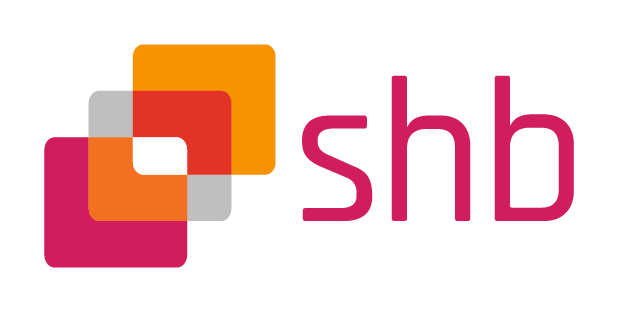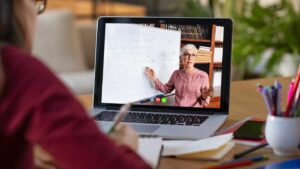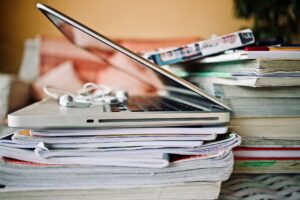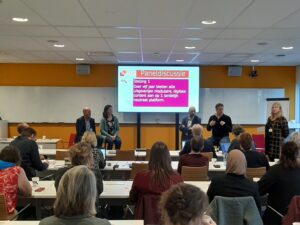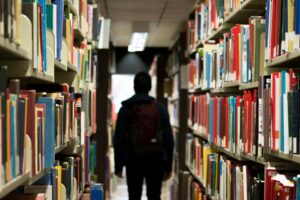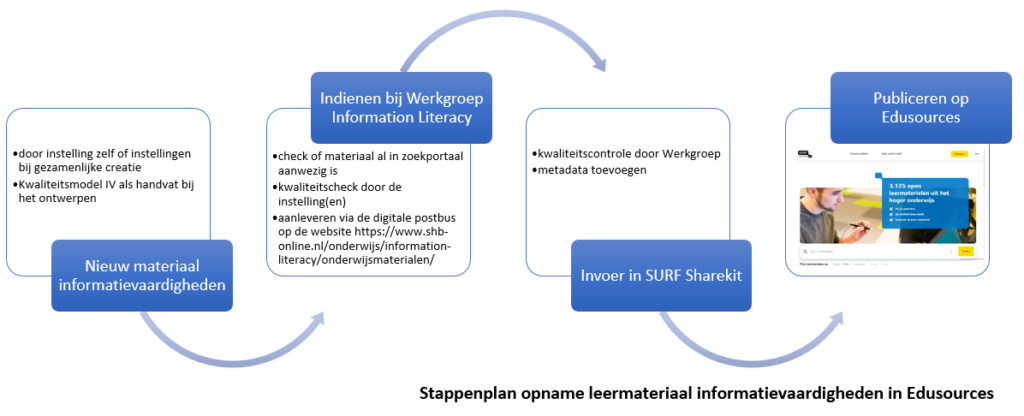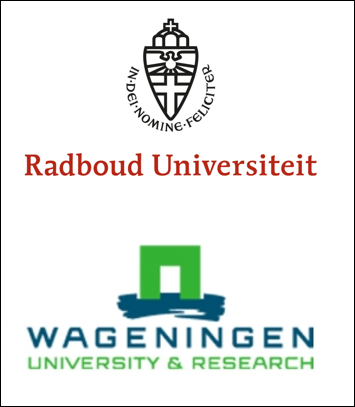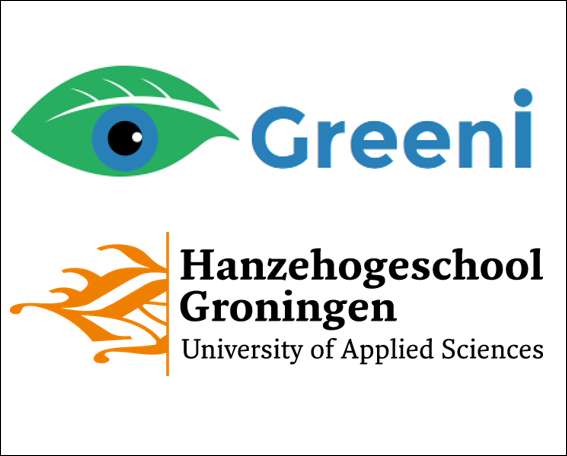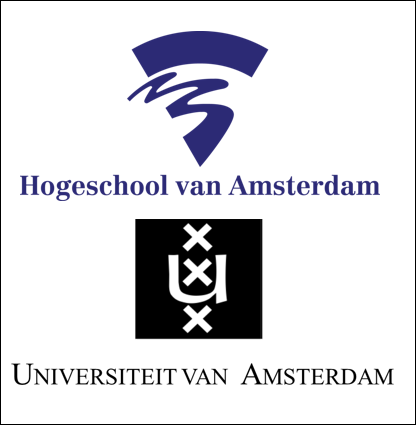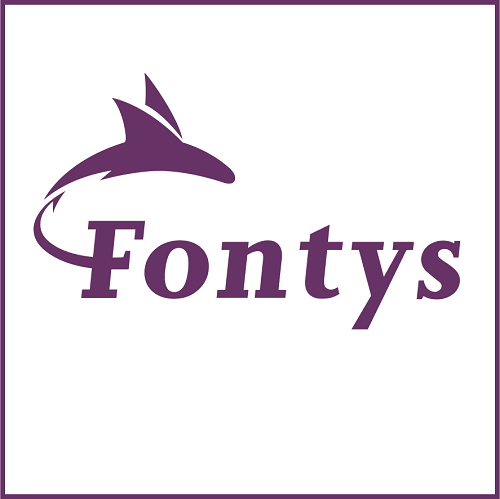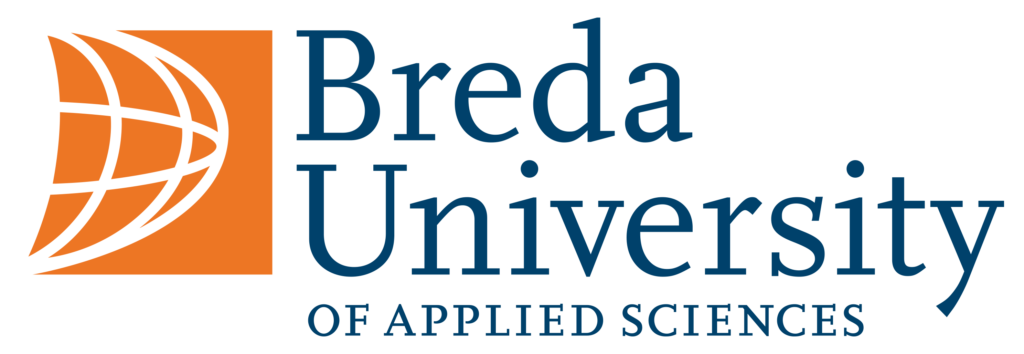Teaching resources
Open sharing, joint development, maintenance and reuse of educational materials has many advantages, such as quality improvement and working more efficiently. The Information Literacy working group works together as a professional community on various aspects, namely:
Search & find | Share | Reuse | Creation | Test questions
Search and find in Edusources
Because it helps if the materials can be found in one place, the Information Literacy working group has shared more than 400 educational materials in the field of information literacy as a starting point (see project).
View all Information Literacy materials on edusources
In the edusources search portal you will find all kinds of materials from Dutch higher education institutions, from a single instructional video to complete series of modules. After your search, there are various filter options in the left menu.
View all Information Literacy materials on edusources
In the edusources search portal you will find all kinds of materials from Dutch higher education institutions, from a single instructional video to complete series of modules. A fter your search, there are various filter options in the left menu.
fter your search, there are various filter options in the left menu.
You will also find an Information Literacy community page with educational materials that are temporarily on display.
Share / Publish in Edusources
Do you want to publish information literacy materials? Which can! If you do not have access to SURFsharekit, you can do so via the Information Literacy working group.
|
In this video you can see how the process works. Process diagrams are also available with a detailed description of the workflows for publishing (document in Dutch) and updating (document in Dutch) learning materials. We will periodically send you an email to check whether the material from your institution is still up to date. Very briefly, the process is as follows. |
The steps to take are:
- Check whether the material is already available in the search portal.
- Check whether the material you want to publish complies with the Information Literacy Quality Model (document in Dutch).
- Do you want to publish it in Edusources? Then send the link or file with the associated metadata via the ‘digital mailbox publishing educational materials‘ (form in Dutch).
- The Information Literacy working group publishes the material after a final check based on the Information Literacy Quality Model (document in Dutch)
- The Information Literacy working group provides feedback to the publishing institution.
Do you have access to SURFsharekit and would you like to share your learning materials in the field of information literacy from the community via edusources? Contact the SURFsharekit administrator at informationliteracy.nl@gmail.com and get the necessary information and access.
Reuse: Open Educational Practices (OEP)
Open Educational Practices (OEP) are inspiring practical examples for using OER. The term can be interpreted in different ways and involves a huge range of practices. In its most basic form, it refers to the reuse of existing teaching resources, such as an instruction film. In its most detailed form, it is about students determining and co-creating their own learning trajectories by using OER. This is sometimes known as ‘open pedagogy’.
Here are a few real-life examples from the Netherlands:
How are OER used?
This LibGuide, which is in Dutch and English, and has been made by Radboud University, is used by Wageningen University & Research for teaching information literacy. Whenever the APA style has to be used with an assignment, then we always refer to the Radboud University LibGuide.
What benefits does using OER bring?
Benefits are:
- Saving time
- The quality of resources benefits if they are shared openly and therefore can be used by others.
Best tip about using OER
- Always check the licence to see how up to date the resources that you are reusing are.
- Never take anything at face value
Organisation: Wageningen University & Research
Contact person: Merel Middelman
Link to OER and OEP: https://libguides.ru.nl/apa/contact
How are OER used?
The Hanze Library had already been planning to develop a literature research LibGuide, but the coronavirus situation gave the matter added urgency. We have decided to use the HBO Groen Information Literacy module as the basis and to adapt it for students and teachers at the Hanze University of Applied Sciences. This includes such aspects as our own catalogue, databases, e-books, etc.
What benefits does using OER bring?
Benefits are:
- Inspiration through a good example.
- Saving time: we have been able to produce a complete LibGuide in a relative short period of time.
- Improvement in quality: building on what is already a good example makes the material even better.
Best tip about using OER
- Use resources with a CC licence and take careful note of the conditions.
- If you do not wish to reuse/copy existing material, be inspired to develop new material.
Organisation: Hanze University of Applied Sciences
Contact person: Yvonne Schuling and Monika Sieron
Link to OER and OEP: https://libguides.hanze.nl/literatuuronderzoek
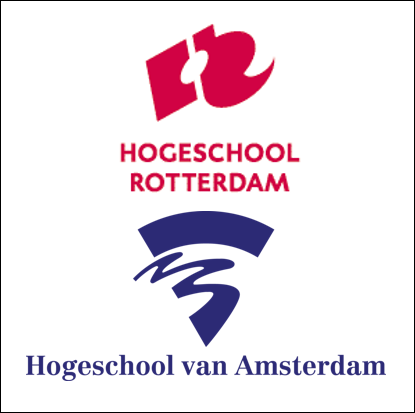 How are OER used?
How are OER used?
To improve the transition of MBO students going to HBO, a linking module has been devised for the ‘doing research’ component. Use was made of most of an excellent module created by Rotterdam University of Applied Sciences for secondary education students, Profile Paper. The content has been adapted, added to, and made suitable for MBO students. Some interactive elements, like videos and quizzes, have been added as well.
What benefits does using OER bring?
Benefits are:
- Saving time
- Inspiration through a good example
- Using an existing good-quality example means you have more time for modifications that are tailored to your own group, and that helps improve the quality.
Best tip about using OER
- Always use your learning objectives and own group as your starting point, and then look at the degree to which existing resources lend themselves to any modifications that may be needed for reuse.
- Always be careful to note the conditions for reusing photographs, for example; use your own material if necessary or material with a CC licence.
Organisation: Amsterdam University of Applied Sciences
Contact person: Harrie van der Meer and Frans Westgeest
Link to OER and OEP: https://maken.wikiwijs.nl/160704/Onderzoeken#!page-5980600
How are OER used?
The Amsterdam University of Applied Sciences Zoeklicht Naslag was modified in 2019 for use by the University of Amsterdam. That involved some differences of emphasis, such as greater prominence for academic information.
What benefits does using OER bring?
Reusing existing material has led to time being saved in the library. It also meant it was possible to meet demand from one of the faculties for an information literacy module in a short time.
Best tip about using OER
- Always use your learning objectives and own group as your starting point, and then look at the degree to which existing resources lend themselves to any modifications that may be needed for reuse.
- Always be careful to note the conditions for reusing photographs, for example; use your own material if necessary or material with a CC licence.
Organisation: University of Amsterdam
Contact person: Janneke Staaks
Link to OER and OEP: http://diensten.uba.uva.nl/zoeklichtnaslag/index.html
How are OER used?
The information literacy toolbox contains a large number of sources from other institutes. This involves other course components and videos, for example. Fontys has also subtitled various knowledge clips by the Amsterdam University of Applied Sciences, with mutual benefits for both institutes.
What benefits does using OER bring?
To follow
Best tip about using OER
To follow
Organisation: Fontys University of Applied Sciences
Contact person: to follow
Link to OER and OEP: http://toolbox.fontysdienstoeno.nl/
How are OER used?
The information literacy toolbox has been created by using existing teaching resources from the libraries of the University of Groningen, NHL Stenden University of Applied Sciences, Amsterdam University of Applied Sciences, and Hanze University of Applied Sciences and additional contributions of our own. The information literacy toolbox is used for teaching at Breda University of Applied Sciences as a supplement, as a work of reference, and as a replacement for traditional teaching.
What benefits does using OER bring?
Sharing content with colleagues and reusing content by colleagues (with modifications to suit your own situation, if necessary) is more efficient. There is no need to reinvent the wheel. Also, reusing and modifying each other’s resources can result in improved quality.
Best tip about using OER
Don’t just use other people’s resources, but share your own content too, so that we can all help each other.
Check the Creative Commons licence. How may you use or reuse resources?
Organisation: Breda University of Applied Sciences
Contact person: Linda Hurkmans
Link to OER and OEP: https://buas.libguides.com/c.php?g=672077&p=4795400
 How are OER used?
How are OER used?
Through informal contact at a GO course, Eline van Vliet (InHolland) heard from a colleague at Rotterdam University of Applied Sciences about the existence of a PubMed training course in the form of a “Wikiwijs maken” arrangement. Because this is easy to copy and adapt, they adapted it to the InHolland situation.
All paramedical courses use it as teaching material.
What does the use of OER bring?
Sharing content with colleagues and reusing content from colleagues (with possible adjustments to your own sitiuation) produces efficiency.
Best tip about using OER
- Make use of Wikiwijs to develop your teaching materials. This online tool is simple to use and easy to reuse, with automatic reference always being made to the source file.
- Material developed via Wikiwijs maken is automatically retrievable via Edusources after open publication.
Organization: InHolland
Contact person: Eline van Vliet (InHolland Eline.vanVliet@inholland.nl) - Brenda Lems (Rotterdam University of Applied Sciences B.Y.Lems@hr.nl)
Link to OER and OEP:
Original material: https://maken.wikiwijs.nl/157678/PubMed_training
Adapted materials: https://maken.wikiwijs.nl/165061/Training_PubMed
Creation
For subjects for which no educational material is yet available, joint development can prevent a lot of duplication of development nationally and also improve quality. The first series of educational materials developed together with the SHB Working Group APA are the APA7 materials. Such as:
- third revised edition of ‘De APA richtlijnen uitgelegd’ (The APA guidelines explained) (by APA Working Group)
- various short knowledge clips that can be found on You Tube and auteursrechten.nl.
- a libguide APA7
Colleagues from the UKB/SHB Information Literacy Working Group and the APA (SHB) working group participated in the APA7 project, namely:
Arjan Doolaar (Hogeschool Arnhem en Nijmegen), Annelies Kuijten (Avans Hogeschool), Alie Mud (Stenden Hogeschool), Rensje Wicherson (Windesheim), Marijke Mentink (Van Hall Larenstein), Yvonne Schuling en Monika Sieron (Hanzehogeschool Groningen), Daniela Hesmer (Hogeschool van Amsterdam) en Noor Breuning (Universiteit van Amsterdam).
Authoringtools per institution
You need software (authoring tools) to create e-learning modules. It is not necessary that all institutions use the same software for this, but it can be useful to exchange experiences and tips and tricks with institutions that use the same authoring tools. Below is a (still incomplete) diagram. Email the editor if you are not yet included in this overview.
| Institution | Authoring tool | Contact |
| Maastricht University | LibWizard | |
| Wageningen University & Research | Lectora | |
| Hogeschool Rotterdam | Wikiwijs | |
| Universiteit Utrecht | Life Long Learning Platform/ Moodle | |
| Hogeschool/ Universiteit van Amsterdam | Wikiwijs | |
| Radboud Universiteit | Xerte (Online Toolkit) | monique.schoutsen@ru.nl |
| Van Hall Larenstein | Wikiwijs |
